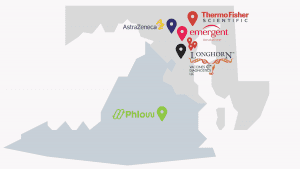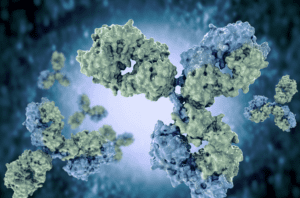
10 International Vaccine Influencers Who Exemplify Maryland’s Leading Role in Public Health
The state of Maryland is the global epicenter of vaccine research and development. This has never been more evident than right now as scores of Maryland companies have risen to the global challenge of developing the first approved vaccine for SARS-CoV-2.
We’ve written extensively about the region’s push to develop a viable, effective and safe COVID-19 vaccine. Companies like Novavax, Emergent BioSolutions and Altimmune are on the leading edge with some of the most promising COVID-19 Vaccine candidates progressing through clinicals. While Maryland as a global vaccine R&D juggernaut might be news to those outside of the region, Maryland’s life science ecosystem has been a leading vaccine R&D hub for years.
In fact, by some estimates, Maryland is home to twenty percent of the top vaccine influencers in the world; the state is also home to three of the top 10 global vaccine manufacturers. The legacy of vaccine leadership and innovation runs deep in Maryland and can be found at the likes of pharma giants like AstraZeneca, whose acquisition of MedImmune was a watershed moment for the region, as well as privately-held, smaller companies like Immunomic Therapeutics and others.
We wanted to address this topic ahead of this year’s World Vaccine Congress that is being held this week in Washington, DC where more than 300 international vaccine influencers from are presenting. In fact, many from this list, or representatives from their companies, are among those presenters.
Who are these Maryland’s international vaccine influencers that are at the forefront of protecting public health? Let’s take a quick tour of some of Maryland’s leading vaccine experts and thought leaders.
Dr. Stephen Hoffman, Sanaria

Dr. Stephen Hoffman is the CEO and Chief Science Officer of Sanaria, Inc., a global leader in malaria vaccine development. Hoffman has led Sanaria since 2003.
Hoffman was recognized as one of the top 50 vaccine influencers in the world by VaccineNation in 2013. From 1987-2001 he was malaria program director, Naval Medical Research Center, where his team were leaders in subunit malaria vaccine development and sequencing the Plasmodium falciparum genome and published the first studies in the world showing DNA vaccines elicited killer T cells in humans. He is the most highly cited author in the world for scientific papers on malaria published between 1995 and 2005, was listed as the third most influential person in the world vaccine industry in 2015 when he received the Vaccine Industry Excellence Award for Best Biotech CEO.
Sanaria has spent more than a decade addressing the challenges of production, purification, cryopreservation, delivery, and administration of PfSPZ, and has an extensive domestic and international patent portfolio covering these innovations. Sanaria’s primary mission is to develop and commercialize vaccines that confer high-level, long-lasting protection against Plasmodium falciparum, the malaria parasite responsible for more than 95% of malaria-associated severe illness and death worldwide, and the malaria parasite for which there is the most significant drug resistance.
Hoffman and the Sanaria team have developed a novel, innovative PfSPZ platform technology. The company has several malaria vaccine candidates in various stages of development and clinical evaluation. Sanaria’s lead malaria vaccine candidate is ready for Phase 3 trials in the US, Europe, and Africa, which have been delayed due to COVID-19.
The company’s overall mission includes developing vaccines that prevent all human malaria. Sanaria is also working on a number of projects that are related to combatting COVID-19, including an orally-administered vaccine candidate called Oracov, which is being developed with partners from the University of Tübingen, Sanaria Inc. and Protein Potential, LLC. Sanaria was recently recognized by the USPTO (United States Patent and Trademark Office) with the prestigious Patents for Humanity Award for developing a whole parasite vaccine for malaria.
Dr. Gregory M. Glenn, Novavax

Dr. Gregory Glenn is the President of Research and Development at Novavax and was the former Chief Medical Officer at MedImmune.
Dr. Glenn leads Novavax’s discovery, clinical, and regulatory teams and has nearly three decades of experience 28 in vaccine development and delivery, including COVID-19 vaccine candidates and RSV, recombinant adjuvanted seasonal and pandemic influenza vaccines, Ebola, and an Enterotoxigenic E. coli vaccine patch. He has also participated in other vaccine development programs including the development of a malaria vaccine. Dr. Glenn was board certified and practiced pediatrics prior to completing a Medical Research Fellowship at the Walter Reed Army Institute of Research where he continued as a clinician-researcher prior to entering into commercial vaccine development in 1997.
Under Glenn’s leadership, Novavax was the first BioHealth Capital Region (BHCR) to announce it had made progress on a COVID-19 vaccine candidate NVX-CoV2373 in late February 2020. NVX-CoV2373 moved into Phase II clinical trials in late August 2020. The company has made a remarkable turnaround since the pandemic outbreak, building new partnerships and adding new leadership team members.
Dr. Teri Heiland, Immunomic Therapeutics (ITI)

Dr. Terri Heiland is the recently appointed CSO and Co-founder of Immunomic Therapeutics, a privately held, Maryland-based biotechnology company. Heiland oversees all of research and development and will play an integral role in business development and the management of ITI’s existing and future partnerships.
Heiland has amassed over two decades of executive leadership experience in the biotechnology and life sciences sector. Heiland is an expert in DNA vaccine design, optimization and development, which has created a broad pipeline of vaccines in oncology, allergy and animal health and has driven licensing deals for ITI with Astellas and Zenoaq. ITI’s investigational UNITE technology platform has the potential to utilize the body’s natural biochemistry to develop a broad immune response and is currently being employed in a Phase II clinical trial as a cancer immunotherapy.
Heiland is an inventor on multiple patents and was a principal investigator on grants from the Department of Defense and the National Institute of Allergy and Infectious Diseases (NIAID).
Bill Enright, CEO, Vaccitech, Ltd.

Bill Enright is a man who has had an influence on two promising COVID-19 vaccine candidates. Enright, the current Vaccitech CEO and the former CEO of Maryland’s Altimmune, is in the unusual position of having ties to two of the more promising SARS-CoV-2 vaccine candidates moving through clinical trials.
As CEO of the University of Oxford’s Jenner Institute spinout Vaccitech, Enright played a key role in securing a licensing deal with AstraZeneca (AZ), which is currently developing a vaccine candidate called AZD1222. The vaccine candidate was co-invented by Vaccitech and the Jenner Institute while the University of Oxford. AZD1222 is currently in Phase III clinical trials involving 30,000 participants.
AZD1222 is not the only promising vaccine candidate that Enright has played a pivotal role in developing.
Enright was formerly the CEO of Altimmune for over ten years before taking the reins of Vaccitech in 2019. He played a critical role in leading the company as it developed the technology that would become the foundation for its potential COVID-19 vaccine. BioBuzz reported in February 2020 that the company had become the second BHCR company alongside Novavax to make progress on a SARS-CoV-2 vaccine candidate. The potential new COVID-19 vaccine has been developed using the same technology that was deployed to create NasoVAX™, Altimmune’s recombinant intranasal vaccine for influenza, which is currently ready for Phase 2B trials.
In July 2020, Altimmune announced with the University of Alabama Birmingham (UAB) positive pre-clinical results for adCOVID. Because of its success developing a promising SARS-CoV-2 vaccine candidate, Altimmune has received significant government funding support, which has resulted in a remarkable increase in its stock value.
Dr. John R. Mascola, NIAID Vaccine Research Center

Dr. John Mascola is the Director of the NIAID’s Dale and Betty Bumpers Vaccine Research Center (VRC), which is part of the National Institutes of Health (NIH). Mascola is an internationally recognized expert on infectious diseases, vaccine research, and viral immunology.
Since 2013, Mascola has led a comprehensive research program aimed at the design, development and testing of candidate vaccines against HIV/AIDS, influenza and other globally important infectious diseases. He has also served as Chief of the VRC Virology Laboratory. According to NIAID’s website, Mascola has also served “…as a principal advisor to the director, NIAID, on vaccines and related biomedical research affairs. In addition, he serves as an expert consultant and advisor both nationally and internationally on the development of novel vaccine strategies against HIV, influenza, and other vaccines of high public health importance.”
Dr. Kelly Warfield, Emergent Biosolutions

Dr. Kelly Warfield is Vice President of Vaccines and Anti-infectives R&D at Emergent Biosolutions, which has been at the forefront of COVID-19 vaccine development and manufacturing news in the BHCR.
Warfield began her scientific career as a student intern at the National Institute of Standards and Technologies (NIST) and National Cancer Institute (NCI). She earned a National Research Council postdoctoral fellowship at the United States Army Medical Research Institute of Infectious Diseases, where she received specialized training working in BSL-3 and BSL-4 containment laboratories. During the fellowship she studied pathogenesis, and developed vaccines and therapeutics for the highly lethal filoviruses.
Prior to joining Emergent Biosolutions in 2014, Warfield Co-founded Integrated Biotherapeutics, Inc. and served as the Vice President of Vaccine Development specializing in the development of antivirals and vaccines for the Ebola and Marburg viruses. At Emergent Biosolutions, Warfield is responsible for the preclinical development of a wide array of antivirals for influenza , other acute virus infections and uncomplicated or classic dengue.
Warfield’s expertise will be critical to Emergent Biosolutions as it continues to build development and manufacturing partnerships with some of the leading COVID-19 vaccine developers in the world.
Dr. Tonya Villafana, AstraZeneca

Tonya Villafana, Global Franchise Head for Infection at AstraZeneca, has almost two decades of experience researching vaccines and monoclonal antibodies to help prevent infectious diseases. In her current role, she leads the global research and development team at AstraZeneca responsible for AZD1222, the AstraZeneca/Oxford University COVID-19 vaccine candidate, and a franchise that includes AZD7442, a combination of two monoclonal antibodies derived from convalescent patients with SARS-CoV-2 infection, discovered by Vanderbilt University and licensed to AstraZeneca.
Villafana works with a team of experts to find solutions to the pandemic, relying on scientific, public health, strategic and operational experience to guide the drug development process and discover innovative solutions. Under Villafana’s leadership, AstraZeneca established its collaboration with Oxford and made strategic partnerships to advance AZD1222’s development as well as to conduct global clinical trials that have moved from Phase I/II to Phase III in weeks rather months. These trials will determine if the vaccine will protect against COVID-19 and measure safety and immune responses in up to 50,000 participants globally across a broad age range and diverse racial, ethnic and geographic groups.
Villafana’s diverse background as a researcher in the U.S., Europe, Japan and Africa helped her develop a global perspective on the immense benefits vaccines offer to public health. Most notably, she was the Site Director of the HIV Vaccine Initiative at the Botswana Harvard School of Public Health AIDS Initiative Partnership for HIV Research and Education in Gaborone, Botswana, where she established clinical sites to conduct the first HIV vaccine studies in the southern African nation, in collaboration with the U.S. NIH HIV Vaccine Trials Network. She was also Director of Portfolio Management at PATH’s Malaria Vaccine Initiative where she worked to advance malaria vaccine development including RTS,S. At AstraZeneca Villafana also has oversight for nirsevimab, a next generation antibody for the prevention of RSV disease in infants.
Dr. Sally Mossman, GlaxoSmithKline (GSK)

Dr. Sally Mossman,VP, Head Discovery Performance Unit at GSK’s U.S. R&D Center in Rockville, MD,, has been a leading vaccine influencer within the region for years. Mossman was one of the founding leadership team members that launched GSK’s vaccine discovery work at the Rockville location.
Mossman helps execute GSK’s vision for being the leader in the vaccines field. Mossman joined GSK in 2006 and spent a decade at GSK’s Belgium location working in early stage vaccine development. She has been with GSK for 14 years in positions of increased responsibility all within the vaccine development group. Prior to joining GSK, Mossman was a Senior Scientist, Group Leader at Corixa Corporation, where she worked to develop novel approaches to vaccines, including adjuvants, delivery strategies, and proprietary antigen candidates for infectious disease and cancer vaccines.
GSK and Sanofi jointly develop its SARS-CoV-2 vaccine candidate. The companies recently announced that their vaccine candidate had moved into Phase I/II trials. GSK has also been at the forefront of the U.S. government’s Operation Warp Speed efforts to accelerate vaccine development and ensure SARS-CoV-2 vaccine can be distributed to as many people as possible should it receive approval. Mossman vaccine development expertise is a key asset to GSK’s COVID-19 efforts and their vaccine development program overall.
To hear more about Mossman’s story, and GSK’s vaccine efforts, you can listen to BioHealth Innovation’s recent BioTalk podcast here.
Kathleen Neuzil, MD, MPH, FIDSA, University of Maryland School of Medicine (UM SOM)

Dr. Kathleen Neuzil is the Director of the Center for Vaccine Development (CVD) at the University of Maryland School of Medicine (UMSOM) and one of the world’s most influential research scientists and advocates in the area of vaccine development and policy. Dr. Neuzil’s storied career includes nearly 20 years of involvement in domestic and international policy, including previous membership on the Centers for Disease Control and Prevention’s Advisory Committee on Immunization Practices (ACIP). Currently, she serves as the only U.S. member of the World Health Organization Strategic Advisory Group of Experts on Immunization (SAGE).
Under Dr. Neuzil’s leadership, UMSOM was the first of the Collaborative Influenza Vaccine Innovation Centers (CIVICS) to be named under the NIAID’s bold strategic plan that released in 2018. In 2019 she lead the CVD to receive a $200M, on of the largest in the School’s history. The seven-year Federal grant to develop a universal flu vaccine. The grant funds efforts to improve the seasonal vaccine, as well as work on the ultimate goal of a universal influenza vaccine that would work for years at a time on most flu variants from a single dose.
She also leads a large Gates-funded consortium (TyVac) to accelerate the introduction of typhoid vaccines into low resource countries, in addition to her robust influenza research program. She is dedicated to training and directs a NIAID T32 Training Grant in Vaccinology, and mentors and supports scientists around the globe.
Throughout her career, she has conducted clinical and epidemiologic studies on vaccine-preventable diseases, contributing to more than 200 scientific publications on vaccines and infectious diseases, many of which inform policy decisions and public health actions. During her time at the global non-profit PATH, Dr. Neuzil was instrumental in the introductions of rotavirus, HPV, and Japanese encephalitis vaccines.
Dr. Steve Projan, former Sr. VP of R&D and Head of Infectious Diseases and Vaccines

Dr. Steve Projan, former Senior Vice President, R&D, Innovative Medicines Head of Infectious Diseases and Vaccines, at MedImmune (now AstraZeneca) and current Principal of the biotech consultancy Beat the Reaper, LLC. continues to have great influence on the field.
Projan has more than three decades of infectious disease drug development, including leading the approval of five anti-infective drugs, including MedImmune’s quadrivalent influenza vaccine in 2012. Before joining Medimmune, Projan was Vice President and Global Head of Infectious Diseases at the Novartis Institutes for Biomedical Research and he also was at Wyeth for 15 years. While at Wyeth, he launched the Biologics Discovery Group and forged multiple collaborative partnerships, including one with Cambridge Antibody Technology. He also worked at the Public Health Research Institute for nearly 15 years. Projan has approximately 110 publications to his name. Recently, Projan has been focused on developing an Ebola treatment and working with the Defense Advanced Research Projects Agency, or DARPA, on a Pandemic Preparedness Platform. Projan also served on the board of WhyWeVax, a non-profit dedicated to the development of educational and advocacy programs to combat vaccine hesitancy.
- About the Author
- Latest Posts
Steve brings nearly twenty years of experience in marketing and content creation to the WorkForce Genetics team. He loves writing engaging content and working with partners, companies, and individuals to share their unique stories and showcase their work. Steve holds a BA in English from Providence College and an MA in American Literature from Montclair State University. He lives in Frederick, Maryland with his wife, two sons, and the family dog.





